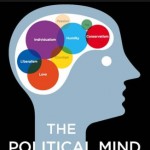The Political Mind, George Lakoff
George Lakoff explores how a better understanding of our brain’s wiring could fundamentally not only our conception of language but also of progressive politics.
Progressives are attached to the Enlightenment ideal of the rational logical individual. Lakoff peels away the layers of reality to reveal how our lives are constructed through language and metaphor formed in our earliest years and in the family setting. The two most basic, ‘deep frames’ we hold are family ones – the nurturant parent vs the strict father. Conservatives employ the strict father frame in language and politics.
Conservatives have understood this and have invested in developing messages which deploy these metaphors and trigger our most deeply held values, while progressives continue to base policy on facts and logic. Conservatives have invested, over decades, in academics, think tanks and policy institutes to develop and embed these frames in public and media discourse.
Policy, Lakoff argues, should always follow from values. If progressives can understand this, using deeply held values such as empathy, cooperation and kindness as their starting point, then they could achieve the change they want to see. While they fail to do this, conservatives and their frames continue to dominate the political spectrum, and progressives engage through these frames, reinforcing them.
An example is tax relief, which depicts tax as an affliction, with a heroic reliever – the conservative politician arguing in favour of a smaller state and low taxation. Another is ‘war on terror’, which worked to depict 9/11 as an act of war, to be retaliated against, rather than a crime that could be policed. This framing, coined by Republicans but bought into by Democrats, set the stage for the actual wars which followed.
“progressives should be talking more about their moral worldview – about empathy, responsibility, and hope – rather than accepting fear-based frames to think and talk within. Instead of moving to the right and activating the conservative worldview, stay without your own moral universe and activate the progressive worldview.” (p.105)
“We would see how empathy is also at the heart of ecological consciousness. It transcends political parties and national boundaries. Our connection to the natural world and to other beings, human or not, is central to our humanity. With the cultivation of empathy, ecological consciousness would permeate every aspect of life.” (p.267)

